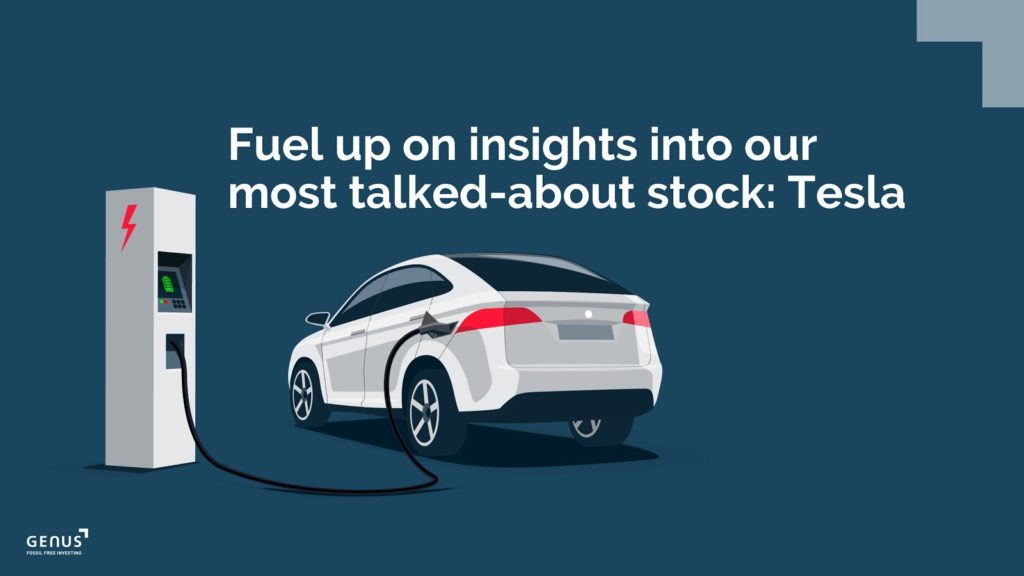Given Tesla’s sustainable impact, the company is considered a 100% impact investment. Here’s a look at why we finally added Tesla to our Genus Fossil Free High-Impact fund last year
When you’re talking about impact investments, it’s hard not to mention the 4,000-pound gorilla in the room: Tesla.
The electric vehicle (EV) and clean energy company (it also produces batteries, solar panels and roof tiles) made its first car, the Roadster, back in 2009, though it took until last year before it was producing a million vehicles annually.
But there’s little doubt that 2020 was Tesla’s year: the company, founded in 2003, debuted on the S&P 500 last December as the most valuable company ever to join the benchmark index.
Tesla is probably our most talked-about stock, given how hot it is.”
Mike Thiessen, Genus’ director of sustainable investments Tweet
Its stock price increased ninefold from January 1 through December 31, 2020,lifting Tesla’s market cap from US$76 billion to US$669 billion over the same period. It’s now worth more than the world’s nine largest automotive companies combined—some of which have been around for over a hundred years.
And Tesla is, without a doubt, transforming the industry it now dwarfs: in January, General Motors—the largest manufacturer of automobiles in North America, and a company that traces its roots back to 1900 and William Durant’s horse-drawn carriages—announced that almost all of the vehicles it produces by 2035 will be electric.
Tesla’s unique spot in impact investing
“Tesla is probably our most talked-about stock, given how hot it is,” says Mike Thiessen, director of sustainable investments for Genus. “But even years ago, we’d have clients who were really passionate about the environment, wondering why Tesla wasn’t in our portfolio (back then).”
For our Fossil Free funds, Genus invests in between 200 and 250 companies that have a net-positive impact on sustainable development around the world. One of the widely used definitions of impact—which Genus uses—looks at the percentage of revenue a company generates from an impactful activity, as defined by the UN sustainable development goals.
Because of Tesla’s sustainable impact, by virtue of its focus on EV and clean energy, the company is considered a 100% impact investment. And yet it wasn’t until the middle of 2020 that Genus included Tesla in its portfolio.
The reasons, says Thiessen, are varied. While Tesla rates exceptionally high on its contribution to sustainable development, the company has not been without controversy. “Tesla is really high impact, but they had some issues, mainly around their labour force,” says Thiessen. “So initially, we didn’t end up investing in them.”
Genus uses a colour-coded system for dealing with controversies that aren’t accounted for in a traditional impact scoring—things like labour, governance and customer issues. Green means there are no significant controversies, yellow means there is something minor worth flagging, orange means moderate controversy—and red means serious controversies, excluding the company from consideration.
“Tesla initially had more yellow controversies than we like,” says Thiessen. “But over time, they’ve either become minor problems or they’ve been resolved.”
As Tesla takes off, Genus watches closely
Over time, the technology that Tesla is using has also gotten better—as has the infrastructure supporting EV vehicles. Tesla batteries have a lifespan five-times that of an average internal combustion engine (ICE) car, providing the opportunity to recycle this central component many times over.
Tesla’s sustainable impact has been bolstered further by greater reliance on renewable energy sources, including solar panels (which Tesla also sells), which present a dramatic opportunity for carbon savings over EVs hooked up to the fossil-fueled power grid.
Preliminary estimates are that global sales of electric vehicles reached nearly 2.5 million in 2020, and that number is expected to rise by about 70% in 2021. For all of Tesla’s success in North America, it is China and Europe that represent the biggest potential for EV sales, with 2021 market shares projected at 44% and 28%, respectively, according to HIS Markit. North America, at just 16%, still has significant room to grow.
As for Tesla, while its meteoric stock rise came to a halt in early 2021, Tesla’s sustainable impact remains as high as ever, according to Thiessen. “Tesla is leading the way when it comes to mass producing batteries. And that’s a big bottleneck in the renewable energy system. We could have massive amounts of solar panels and wind turbines, but if we don’t have these batteries for EV, it doesn’t really matter.”
Get in touch if you’d like to explore how investing in companies like Tesla can make a positive impact on your investment portfolio.


2026 Investment Outlook: Perspectives on Market Trends and Risks












